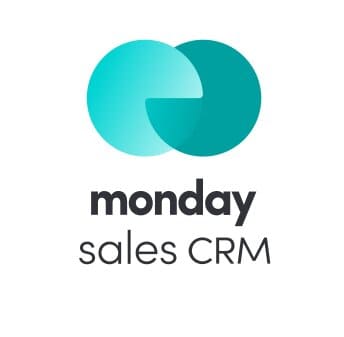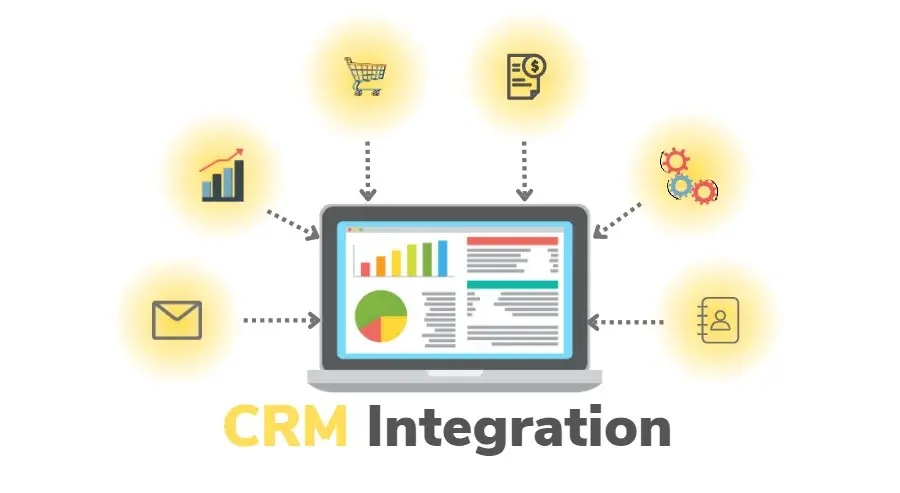What is CRM Integration?
CRM integration is the process of linking your company's software applications with your CRM system. These applications can range from accounting and lead generation to sales and social media tools.
By integrating these apps, you centralize data, making it easy to access, sync, and share. This streamlines data management and provides a comprehensive view of your business operations. With everything connected, you can efficiently oversee the entire customer journey within your CRM.
Here are popular CRM tools for integration to consider:
Advantages of CRM Integrations for Businesses

CRM integrations streamline your business operations, freeing up time for you and your sales and marketing team and simplifying overall management. Here are some key benefits of CRM integration:
Saving time when moving between apps
Integrations eliminate the need to log into multiple systems, manage passwords, or switch between numerous windows. For instance, without CRM email integration, sending an email to a prospect requires finding the email address in your CRM, copying it, opening an email service like Gmail, pasting the address, and then composing the email. With CRM email integration, you can do everything within one interface in just a few clicks.
Smooth data transition
When specific tools integrate with CRM, it ensures that all customer data is centralized, eliminating the need for manual data transfers and reducing the risk of errors from handling multiple CSV files and spreadsheets. For example, to email clients who haven't purchased in six months without CRM email integration, you would filter the customers in your CRM, download their email addresses, upload them to an email automation service, and then write the email. With CRM email integration, all relevant data is instantly available, allowing you to start creating the email immediately.
Decreased workload
With CRM integrations, all controls are centralized, reducing the need to manually sync different systems and activities. This cuts down on workload, minimizes human error, and boosts CRM marketing performance. Training employees becomes more efficient, as they only need to learn the CRM system rather than multiple business tools. This automation can also reduce hiring costs, as fewer employees can handle more tasks.
Improve your consumers' experience
Having all client information in one place, along with the necessary integrations, allows for regular communication, relevant offers, and quick, effective problem resolution, enhancing the user experience. For example, if a client has an issue with their order and messages your chat, a CRM chat integration lets you quickly find the order, check details, and respond with accurate, up-to-date information.
10 Best CRM Integrations for Your Business

Consider these 10 must-have CRM integrations to boost your team's productivity:
1. Email Integrations📧
Emails are crucial for communication with prospects, customers, and team members. Integrating it with your CRM allows for automatic capture and organization of customer interactions in one centralized location. This integration gives your sales team a complete view of customer history, enhancing response times and personalization. Additionally, you can sync emails, send personalized marketing campaigns, and track email opens and responses.
Popular email integration platforms include Gmail, Microsoft Outlook, and Mailchimp.
[Related article: 7 Best CRM for Gmail (Free & Paid)]
2. Calendar Integrations🗓️
Connecting your calendar to your CRM aids in tracking and organizing customer appointments, meetings, and important events. For example, when a client requests a meeting via email, you can check your availability and schedule the event directly within the CRM. The system can also automatically send invitations and meeting notifications to the client, simplifying your workflow.
Popular calendar tools to integrate with your CRM include Google Calendar, Microsoft Office 365 Calendar, and Calendly.
3. Marketing Automation Tools Integrations🎯
When marketing automation tools integrate with CRM, it is crucial for businesses aiming for a comprehensive customer view and effective multi-channel marketing. By linking your marketing channels to your CRM, you can automate campaigns, accelerate the sales process, and boost deal closures. This integration lets you plan, execute, and track campaigns, collaborate with your marketing and sales team, and convert leads into sales more efficiently.
Key marketing CRM tools to integrate with your CRM include Salesforce, HubSpot, and ActiveCampaign.
4. Help Desk Integrations☎️
Integrating help desk software with your CRM links your customer support and ticketing systems. This integration enables support agents to access customer information and history while handling inquiries or issues. Many help desk solutions can sync your contact list to track performance, generate reports, improve customer data management, and develop targeted marketing campaigns based on ticket data within your CRM system.
Popular help desk integration solutions include Freshdesk, Zendesk, and ServiceNow.
5. Live Chat Integrations💬
Adding live chat software to your CRM provides an effective way to manage customer relationships. It equips your team to oversee, track, and gain insights into both current and potential customers. This integration automates the logging and syncing of customer conversations with your contact list, saving valuable time. With this data at hand, your team can understand customer behavior, preferences, and trends to design targeted marketing campaigns.
Popular live chat applications that can be integrated with your CRM include Zendesk Chat, Intercom, and LiveChat.
6. Accounting Integrations💲
Integrating accounting software with your CRM provides valuable insights into customer interactions and financial performance. This integration centralizes data management, allowing users to access and manage customer information and financial data in one location, reducing manual data entry and minimizing errors. Additionally, it improves customer billing and invoicing, streamlines financial reporting and analysis, and aids in better customer segmentation.
Key accounting tools to integrate with your CRM include QuickBooks, Xero, and FreshBooks.
7. Prospecting Software Integrations📈
Linking a prospecting tool with your CRM enables more personalized interactions with leads. It streamlines your sales process by centralizing all prospecting and communication data, minimizing the risk of lost or compromised contact information. This integration boosts the effectiveness of your sales opportunities and fosters better collaboration and lead qualification for your entire team within the CRM.
Popular prospecting software to integrate with your CRM includes ZoomInfo, Spotio, and LeadIQ.
[Related article: What Is the Difference Between Apollo vs ZoomInfo?]
8. E-commerce Integrations🛒
For businesses that sell products and services online, integrating e-commerce tools with your CRM is essential. This integration offers valuable insights into customer preferences and synchronizes customer orders, transaction histories, and order statuses. As a result, you can implement personalized marketing, generate detailed sales reports, and enhance customer service.
Popular e-commerce platforms to integrate with your CRM include Shopify, WooCommerce, and Magento.
9. Event Integrations📅
Connecting your event management software to your CRM system streamlines information sharing about company contacts and potential leads, simplifying the tracking of ticket sales and the generation of event success reports. Whether you’re organizing in-person or virtual events, this integration helps you understand how ticket sales and attendance affect your sales pipeline.
Event software that can be integrated with your CRM includes Eventbrite, GoTo Webinar, and Cvent.
10. Proposal and Document Integrations📋
When closing a deal, the last thing you want is to waste time hunting for paperwork. This CRM system integration is essential because it provides easy access to essential sales materials, contracts, and proposals directly from your CRM. Additionally, it automatically links documents to client contacts, ensuring continuous data synchronization.
Proposal and document software that can be integrated with your CRM include DocuSign, PandaDoc, Dropbox, and Google Drive.
Powerful CRM System

4.7
How to Set Up CRM Integrations
There are several methods to integrate apps with a CRM system:
Using third-party data integration tools
These tools allow you to set up connectors without needing coding skills. They offer pre-built integrations with many popular apps, enabling you to establish connections with just a few clicks. This is the simplest and most common method.
Using APIs
APIs provide a flexible way to integrate apps, suitable for both small tasks and long-term needs. API integration allows you to add or remove integrations as your business requirements change.
Writing custom code
Building code to enable integration between apps can be complex and requires ongoing maintenance, especially when software updates occur.
Purchasing software from a single vendor
This ensures automatic built-in integrations between apps. However, a single provider might not offer everything you need to support all your business processes.
[Related article: 5 Best LinkedIn CRM Integrations in 2024]
Why is an Integrated CRM Important for Your Business Success?

A fully integrated CRM system is crucial for business success for several reasons. First, it helps you and your team gain a deeper understanding of customer needs, which is vital for success. By tracking customer interactions, you can offer personalized solutions that foster trust between your company and its customers. This leads to an improved customer experience that is seamless and consistent across different areas, building brand loyalty and encouraging repeat business.
Furthermore, CRM integration increases efficiency and productivity by automating routine tasks and optimizing workflows. This allows your employees to focus on more value-added activities, boosting productivity and profitability. Additionally, an integrated CRM provides real-time insights into customer behavior, driving sales performance and other key metrics. This enables your team to make more informed business decisions, identify growth opportunities, and optimize operations to improve profitability.
[Related article: Discover the Benefits & Challenges of CRMs in Business]
Selecting the Appropriate CRM
In essence, a completely integrated CRM system can assist in establishing stronger bonds with customers, enhancing internal communication and collaboration, improving the customer experience, and boosting efficiency and productivity. This, in turn, empowers you and your staff to make better-informed business choices. Ultimately, these advantages contribute to your business's ability to achieve lasting success in a market.




.png)
.png?width=140&height=140&name=Noah%20(1000%20x%201000%20px).png)



